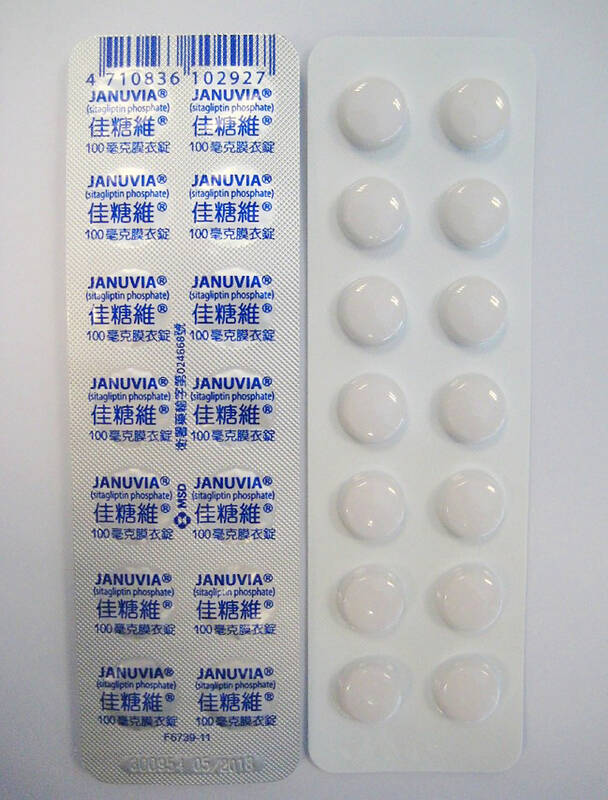The Food and Drug Administration (FDA) yesterday announced the recall of three types of drugs over excessive impurities or failing a dissolution test, including a diabetes drug with a 100 percent share of the local market.
The three types of drugs are three batches of 100mg Januvia F.C. tablets (佳糖維100毫克膜衣錠), a batch of 30mg Lexinping capsules “Tai Yu” (台裕樂心平膠囊30毫克) and a batch of 10mg Sermion tablets (適脈旺糖衣錠10毫克).
The Januvia film-coated tablets, the main ingredient of which is sitagliptin (as monohydrate phosphate salt), is prescribed to adults with type 2 diabetes to improve blood sugar control.

Photo copied by Wu Liang-yi, Taipei Times
Its drug permit holder, Merck Group Taiwan, had notified the FDA about finding excessive levels of impurities.
The three batches — U011910, U015917 and U018641 — would be recalled by Jan. 21, the FDA said.
Although the drug has a 100 percent market share, with more than 27 million tablets used annually, only about 1.2 million tablets are being recalled, said Hung Kuo-teng (洪國登), head of the FDA’s Medicinal Products Division.
There are other drugs with different ingredients that diabetes patients can use as replacement, Huang added.
Lexinping is mainly used to treat depression. The manufacturer decided to recall batch WE1304, comprising about 16,000 capsules, after samples taken from the batch were found to have a dissolution rate that failed to meet the specifications, which could affect the efficacy of the drug.
Hung said Lexinping capsules have only about a 3 percent market share, with about 820,000 capsules used per year, so there should not be a shortage of medication due to the recall, adding that the recall would run through Jan. 14.
Sermion tablets are mainly used to improve peripheral blood circulation. Its manufacturer, Viatris Pharmaceutical, detected impurities that failed to meet the specifications while conducting a stability test, and is recalling batch DN2443, which comprises about 2.7 million tablets.
Hung said that about 6.3 million Sermion tablets are used in the nation per year, translating into a market share of about 60 percent, but as there are alternative drugs, the recall would not cause a shortage of medication for patients.
Additional reporting by CNA

Costa Rica sent a group of intelligence officials to Taiwan for a short-term training program, the first time the Central American country has done so since the countries ended official diplomatic relations in 2007, a Costa Rican media outlet reported last week. Five officials from the Costa Rican Directorate of Intelligence and Security last month spent 23 days in Taipei undergoing a series of training sessions focused on national security, La Nacion reported on Friday, quoting unnamed sources. The Costa Rican government has not confirmed the report. The Chinese embassy in Costa Rica protested the news, saying in a statement issued the same

Taiwan’s Liu Ming-i, right, who also goes by the name Ray Liu, poses with a Chinese Taipei flag after winning the gold medal in the men’s physique 170cm competition at the International Fitness and Bodybuilding Federation Asian Championship in Ajman, United Arab Emirates, yesterday.

A year-long renovation of Taipei’s Bangka Park (艋舺公園) began yesterday, as city workers fenced off the site and cleared out belongings left by homeless residents who had been living there. Despite protests from displaced residents, a city official defended the government’s relocation efforts, saying transitional housing has been offered. The renovation of the park in Taipei’s Wanhua District (萬華), near Longshan Temple (龍山寺), began at 9am yesterday, as about 20 homeless people packed their belongings and left after being asked to move by city personnel. Among them was a 90-year-old woman surnamed Wang (王), who last week said that she had no plans

TO BE APPEALED: The environment ministry said coal reduction goals had to be reached within two months, which was against the principle of legitimate expectation The Taipei High Administrative Court on Thursday ruled in favor of the Taichung Environmental Protection Bureau in its administrative litigation against the Ministry of Environment for the rescission of a NT$18 million fine (US$609,570) imposed by the bureau on the Taichung Power Plant in 2019 for alleged excess coal power generation. The bureau in November 2019 revised what it said was a “slip of the pen” in the text of the operating permit granted to the plant — which is run by Taiwan Power Co (Taipower) — in October 2017. The permit originally read: “reduce coal use by 40 percent from Jan.